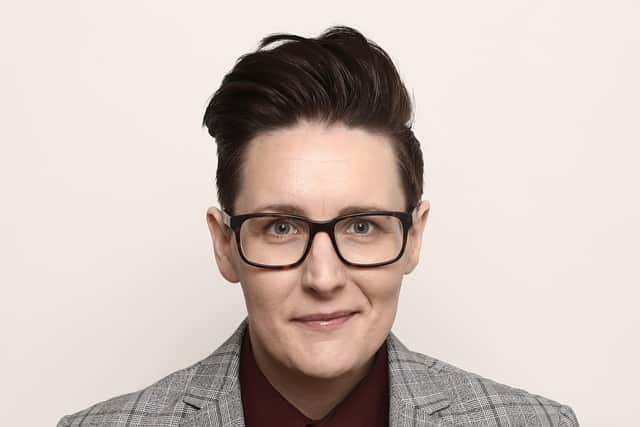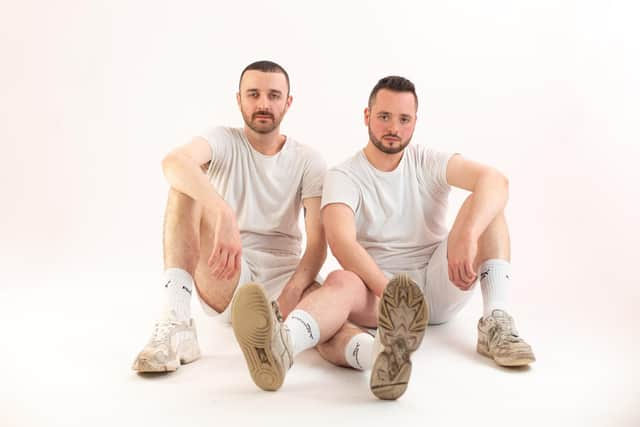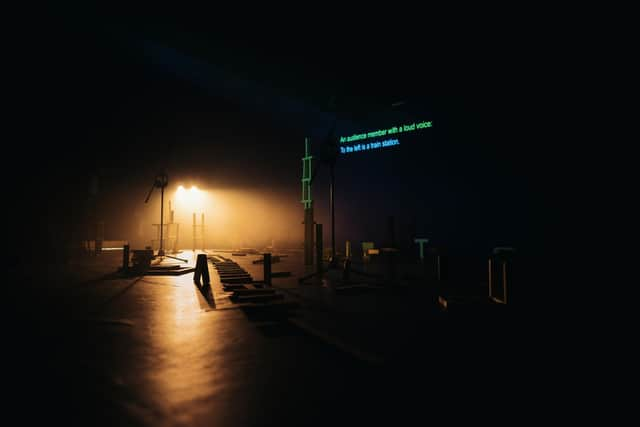'I was gutted. Then I got angry' - how class and money are taking centre stage at the Fringe
When comedian Sian Davies was invited to audition for a high-profile comedy showcase at the Fringe in 2018, she was over the moon. Then she was told that if she was successful, she’d have to front £1800 by the end of the week – did she have the money?
“If they want you to ride a horse in an audition, you tell them you can, then you learn to ride a horse,” says Davies. A friend, a fellow comedian, immediately set up a crowdfunding page for her online.
“Within an hour of that crowdfunder going live, the promoter rang me and dropped me from the audition,” she remembers. “They said I’d lied about the state of my finances, and that perhaps this sort of thing wasn’t for me. I was absolutely gutted. And then I got angry.”
For Davies, a working-class comedian from Liverpool, the experience crystallised that to make a success at the Fringe, you need money behind you. So what about those comedians and other artists who share her background, who work and save all year to attend the Fringe, and can’t afford to pay for the right opportunity?
Davies responded that year by setting up Best in Class, a crowdfunded, profit-sharing show aimed at working-class comedians, which this year returns with Jed Salisbury, Tamsyn Kelly, Micah Hall, Molly McGuinness, Lovdev Barpaga, Anna Thomas, John Meagher and Sapphire McIntosh on a rotating bill. With a cost-of-living crisis upon us, Best in Class is here to capture a moment of class awareness.
Yet Davies and her crew are far from the only working-class acts on the Fringe. Comedian Jake Farrell, the son of a postman and an NHS worker, is from Stevenage, “the world’s first new town… envisaged as a working-class utopia by an interventionist socialist government”, which was built on post-war working-class migration from London.
His show is partly founded on the experience of being part of the university boom generation, having to move away from home and be “dropped in an ancient city aged 18 to try and survive socially and academically among aloof public schoolboys who had done gap years in Sri Lanka”.


Sikisa is another working-class comic, from Stockwell in south London, although people don’t often recognise her class background. “People have referred to me as middle-class because I’m a lawyer, but I don’t work for a big corporate law firm,” she says. “I work in legal aid, which is basically legal working class. Everything I have I’ve worked for, and that makes me proud.” She’s worked long shifts, seven days a week, to fund her Fringe.
This experience doesn’t just apply to working-class comedians. Actor Tony McGeever is London-based, but Edinburgh-born and Bonnyrigg-raised. In Heroin to Hero, he tells the true story of Edinburgh man Paul Boggie, who beat heroin addiction to join the Army and become a guard at Buckingham Palace.
“I’ve been absolutely determined to get this show to Edinburgh, but it’s been tough as it’s self-funded,” says McGeever. “It’s a really expensive thing to do even with a one-man show – we’ve crowdfunded and I’ve done everything I can to finance the project. I’ve been really fortunate that it was accepted as part of Army @ The Fringe, who provided an excellent deal and lots of support.”
More working-class theatrical voices can be heard in Double Drop, about a culture clash in the 1990s between raves in the abandoned Welsh slate quarries of Snowdonia and the Welsh-speaking Eisteddfod culture. “It celebrates love and community and a working-class place,” the company tell us. “It shows everyone that stories rooted in Welsh working-class experience are more complex and joyful than the stereotypical poverty porn audiences are fed on telly.”


Two new plays at Summerhall aren’t written by working-class writers, but they address compelling and necessary issues and are made by companies of mixed backgrounds. “About Money is an anti-capitalist fairytale,” says playwright Eliza Gearty, who moved from Kentish Town in London eight years ago, and now works in hospitality and social care.
“It’s about an unconventional but loving family of three, whose lives are slowly torn apart by the demands of (one of their) zero-hours contract jobs. I first started writing the play in 2017, when I was working a zero-hours contract and had just joined a trade union. It’s about the devastating and far-reaching impact of precarious employment, not just on workers, but also on the families they support. It’s also a play about fighting back, and making the decision to stand up to bad employers. Precarious work and the ‘gig economy’ are on the rise, but we’ve also seen youth membership grow within trade unions for the first time in decades.”
Her fellow playwright Nathan Ellis describes his own new piece: “Work.txt is a show about work, performed entirely by the audience. There’s a moment in our show where people who earn over £30,000 a year have to say a line identifying themselves – it’s interesting how this small show of class difference feels transgressive in a society where class is constantly manifest, yet rarely specifically acknowledged.”
Alan Bissett should be familiar to Scots readers; he describes a scene in his new play Moira in Lockdown where the lead Falkirk housewife character (played by Bissett) attends the Festival and her Scots accent becomes an issue. “The scene functions because working-class voices at the Fringe are still a rarity,” he says. “It’s a shame, because working-class audiences will often be drawn from other places in the Central Belt for a ‘day at the Fringe’, and I think they’re hungry for work that reflects their own backgrounds. But in the absence of home-grown, working-class voices, because of prohibitive costs for performers, they’ll default to seeing comedians from down south who they’ve seen on the telly, or who have large marketing spends.”


Craig Manson is one half of Gayboys, a theatre show about gay male identity, with Conner Milliken, the pair having perfected their work in queer Glasgow clubs like Queer Theory and Shoot Your Shot. “When I graduated, I had three part-time jobs while trying to be a freelance artist,” he says. “I worked in this way for years without much sense of personal success, and I still barely made ends meet. I felt confused. What was I doing wrong? How did other artists seem to do so well? I felt such a sense of failure and shame that I had multiple jobs, that I wasn’t a ‘real’ artist in comparison.”
Manson grew up in Wick in Caithness, and moved to Glasgow for drama school in 2012. “I can’t make judgements about other artists,” he says. “Everyone has different circumstances I won’t be aware of, but statistically working-class artists are the most under-represented demographic in the arts.
“Personally, I wonder what it would be like to be an artist if I didn’t have to pay rent or owned my own flat, if I had inheritance money or a family nest-egg, if I had connections to people in positions of power in the industry, or if my upbringing had been enriched with more international travel, broader experiences and more understanding of how the arts worked. I’m not saying those things are exclusively middle-class, but they’re definitely not things I’ve ever had the privilege of leaning on.”
It’s an interesting point to make – when many people are struggling financially, who is ‘working-class’? “It’s a difficult one, and I don’t think we’ve got it right on defining it,” says Davies. She points out that the government might ask who a household’s main breadwinner was when 14, but she knows from personal experience this means little: her own father died when she was 17, which had a massive impact on her family’s income and outlook.
“For Best in Class, what we do is ask people to define themselves,” she says. “I run a queer showcase as well, and I don’t ask anybody that applies to prove to me they’re LGBTQIA+. We’ll take applications on face value – we’re not going to come around and count how many pairs of trainers you’ve got – but it’s not for people who have had a middle-class upbringing, but now they’re an artist, so they feel they’re struggling.
“They’ve benefited from the trappings of that upbringing. It’s about things like where you went to school, the environment you grew up in. My secondary school didn’t teach me the art of an elevator pitch or how to network with people, and I didn’t come out of school with contacts. I went to a comprehensive, and it was rough – I got taught to know my place, to go out, get a job and listen and do what I’m told, because that’s all that was expected. Lots of things make up the class discussion and how we define it, and we’re not really getting it right.”
Even the Free Fringe, the supposedly budget option, has huge demand on its spaces, and accommodation prices in Edinburgh are booming this year. But for artists of any class, it’s still the greatest and perhaps only chance for a big break, and anything but a jolly. So why should artists be de facto excluded because of their background?
“The beauty of the Fringe lies in the incredible, alchemical set of conditions (for audiences and exposure) that it creates, which make performers sacrifice more and more every year to do it,” says Jake Farrell. “But for anyone less fortunate than me in terms of their employment or their ability to prioritise, if they have kids or caring responsibilities, for instance, it would literally be impossible. I just think more people need to say, ‘Yes, we love the Fringe,’ but also to ask, ‘Why does it have to be this hard?’ Can we make the economics of it all add up? Can we open the door to more people? I would love to see that.”
Best in Class, Laughing Horse @ The Counting House, 8.45pm, until 28 August
Sian Davies: About Time, Gilded Balloon Teviot, 5.40pm, until 28 August
Jake Farrell: Sky, Pleasance Courtyard, 8.40pm, until 28 August
Sikisa: Life of the Party, Pleasance Courtyard, 8.25pm, until 28 August
Heroin to Hero, Army @ The Fringe, 7.15pm, until 28 August
Double Drop, Summerhall, 3.20pm, until 28 August
About Money, Summerhall, 10.20am, until 28 August
Work.txt, Summerhall, 1.15pm, until 28 August
Moira in Lockdown, Scottish Storytelling Centre, 6.30pm, until 23 August
Gayboys, Summerhall, 8.45pm, from 16 until 28 August